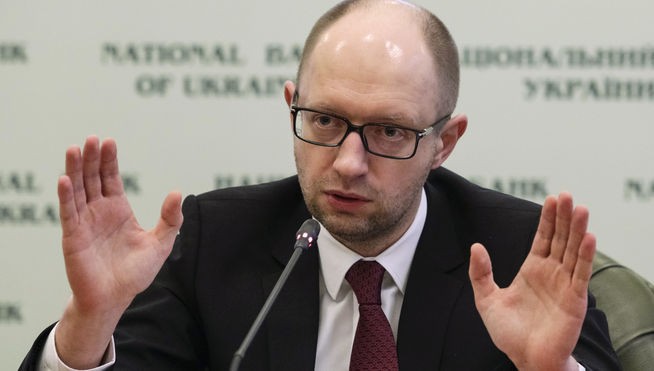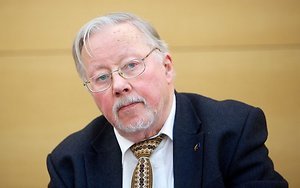The announcement about the resignation of Arseniy Yatseniuk may be characterized as a move toward overcoming the political crisis in which our country finds itself. But, in fact, it only marks the beginning of the possible deepening of the crisis. Not only will the resignation of the prime minister not stabilize the coalition and the government, but it may also provide the impetus for greater distrust of the government. And now this distrust may have unforeseen consequences for the head of state and the government for which he actually will be responsible.
It is important to realize that the current crisis is primarily the result of the infighting among the reformers themselves.
Many participants in this struggle can be understood from the perspective of the political situation. One can understand the position of the leaders of the political parties, who are guided by social demands. After all, they are convinced that the decline in living standards of the population is an opportunity to increase their own representation in parliament. But, at the same time, neither the population nor, sadly, the leaders of these parties are capable of understanding that there are no more resources in the country for raising standards and that there will be none until a different economic model is launched. And this means that any Ukrainian government will have to coordinate its policies with international creditors.
One can understand the former Georgian president Mikheil Saakashvili, who seeks to establish himself in Ukraine after his defeat in Georgia. However, Saakashvili himself is unable to assess the reasons for his defeat properly, explaining them by some "special operation" without noticing that the fiasco was due to the absence of results in the two areas that were most important for Georgia (as they are now for Ukraine) -- deoligarchization and the restoration of the territorial integrity of the country. This is why Saakashvili does not realize that he does not have the recipe for deciding these main problems without which Ukrainian reform will not give suitable results and will only bring about the defeat of the reformers.
But the one person who is really difficult to understand is the president of Ukraine. To increase his control over the powers of government, this experienced politician has dared to weaken the balance of power and has actually refused to support the cabinet of ministers until the prime minister is exchanged for his own ally. Furthermore, the president did not need early elections -- his party is unlikely to repeat its results in the future -- nor revenge -- he is still head of state.
As a result, we have arrived at the moment of the prime minister's resignation in a situation where the president has practically lost the public's trust because of the Panama scandal and the failure of the Dutch referendum. And the issue is not even whether accusations against Petro Poroshenko regarding the illegality of his offshore operations are justified, or whether the disclosures about the "Panama dossier" influenced the Dutch vote. The issue is that trust has already been lost. And in this situation any government that a representative of the Petro Poroshenko Bloc forms inevitably will share in the distrust of the real leader of the Petro Poroshenko Bloc. In all honesty, this would have happened even without the Panama history. Just not that rapidly.
Based on all this, I venture to state that the political crisis in the country has not ended with the resignation of Arseniy Yatseniuk. The more accurate conclusion would be that the resignation of Arseniy Yatseniuk marks only the beginning of the political crisis.
To overcome this crisis the following steps are required.
- Impartial and competent investigation of the "Panama dossier" matter with the full cooperation of the president. In a situation where neither the Anti-Corruption Bureau nor the General Prosecutor's office are able to handle this investigation, the president and parliament should initiate the creation of a special commission with the participation of international experts . The renewal of trust will not be achieved through a handful of newspaper articles. It requires a legal conclusion that will be respected by Ukrainian society as well as the civilized world.
- Rejection of all attempts to have one of the political parties in the coalition prevail at the expense of others and rejection of the irresponsible juggling of ratings and poll data in order to increase one's own control of the government. The president and his party are risking such (low) ratings in the coming months that they will be unable to take any responsibility for the country's future.
- Return to the balance of political forces in the coalition according to the model of a parliamentary-presidential republic. And the refusal of early parliamentary elections, which will help leaders of the socially oriented political forces to focus their energy on changes in the country and not on the preparation for elections. At the same time, the activity of the head of the Odesa Oblast (Saakashvili) and his team should be directed -- with the support of the president and the government -- at obtaining concrete reforms in this region and on turning it into a training field for change and not colorful explanations of why nothing can be changed.
- Appointment of an independent Prosecutor General of Ukraine, who will enjoy the trust of society and parliament and who will reform the structure and staffing of the Prosecutor General's office.
- Proposals by the president of his own initiatives for radical judicial reform without which any talk of economic transformation is absurd and investments unattainable.
These are only the first steps to overcome the crisis. Without their immediate implementation, the crisis will take on avalanche-like proportions and may lead to the total destabilization of the situation in the country, the final collapse of trust in institutions, and the long-term defeat of reform -- all against the backdrop of aggression and war. Naturally, much more will need to be done, but this is where to start.




